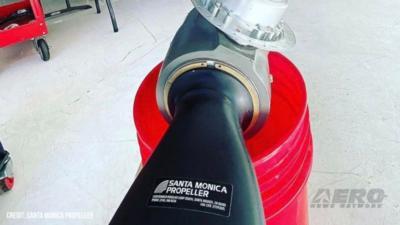Sun, Apr 21, 2024
NTSB Issues Safety Alert on Aluminum Prop Blades
Aviation authorities have recently emphasized the critical importance of regular and thorough inspections of aluminum propeller blades, especially for aircraft frequently operating in harsh environments such as backcountry, aerial application, and coastal areas.

These guidelines aim to enhance the safety and airworthiness of the fleet by preventing propeller blade failures that could result in severe accidents.
The recommended practices focus on meticulous inspections at various stages of a propeller's operational lifecycle. Maintenance personnel are advised to follow a systematic approach by adhering to the maintenance manual and employing detailed checklists. This includes inspecting every part of the propeller, especially the leading edges and back sides of the blades, which are prone to damage. Sections of larger propellers should be marked off to ensure no area is overlooked.
Utilizing optimal lighting conditions and magnification tools is crucial for identifying any potential damage, especially those that might be concealed by cosmetic painting. This attention to detail helps in detecting underlying issues that could compromise the propeller's integrity and functionality.

Moreover, post-maintenance checks are highly recommended, involving a secondary review by another qualified individual, which could be another mechanic or a pilot, depending on the type of repair. This practice is aimed at ensuring that all maintenance work meets the necessary safety standards.
For aircraft not governed by standard overhaul timelines, such as public aircraft and certain parts of private operations, it is advised to maintain propellers strictly according to the manufacturer’s guidelines. This includes adhering to recommended overhaul schedules and keeping detailed records of all inspections and repairs in the propeller logbook.
The FAA's Advisory Circular AC 20-37E on Aircraft Propeller Maintenance and other service documents provide comprehensive guidance on maintaining propeller blades. These documents are vital for keeping maintenance personnel updated on best practices and new technological advancements in propeller maintenance.
As aircraft operations continue to evolve, the emphasis remains on ensuring that all components, particularly propellers, are maintained to the highest safety standards. This proactive approach in regular maintenance and inspection is essential for the safety of the aviation industry.
More News
Performance-Based Navigation (PBN) [ICAO] Area navigation based on performance requirements for aircraft operating along an ATS route, on an instrument approach procedure or in a d>[...]
The Airplane Came To Rest Underneath A Set Of Damaged Power Distribution Lines On The Floor Of A Coulee On June 19, 2025, at 1412 mountain daylight time, a Cessna 172K airplane, N7>[...]
Aero Linx: FAA Managers Association (FAAMA) Recognized by the FAA, FAAMA is a professional association dedicated to the promotion of excellence in public service. The Association i>[...]
From 2023 (YouTube Edition): Jet Central Micro-Turbine Engines Impress Founded in the late-1990s, Mexico City-based Jet Central produces a unique and fascinating line of micro-turb>[...]
Also: ANOTHER Illegal Drone, KidVenture Educational Activities, Record Launches, TSA v Shoes The Senate confirmed Bryan Bedford to become the next Administrator of the FAA, in a ne>[...]
 ANN's Daily Aero-Term (07.10.25): Performance-Based Navigation (PBN) [ICAO]
ANN's Daily Aero-Term (07.10.25): Performance-Based Navigation (PBN) [ICAO] NTSB Prelim: Cessna 172
NTSB Prelim: Cessna 172 ANN's Daily Aero-Linx (07.10.25)
ANN's Daily Aero-Linx (07.10.25) Classic Aero-TV: The Big Business of Diminutive Powerplants
Classic Aero-TV: The Big Business of Diminutive Powerplants Airborne 07.11.25: New FAA Bos, New NASA Boss (Kinda), WB57s Over TX
Airborne 07.11.25: New FAA Bos, New NASA Boss (Kinda), WB57s Over TX




